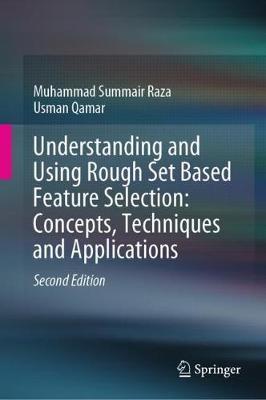Overview
This book provides a comprehensive introduction to rough set-based feature selection. Rough set theory, first proposed by Zdzislaw Pawlak in 1982, continues to evolve. Concerned with the classification and analysis of imprecise or uncertain information and knowledge, it has become a prominent tool for data analysis, and enables the reader to systematically study all topics in rough set theory (RST) including preliminaries, advanced concepts, and feature selection using RST. The book is supplemented with an RST-based API library that can be used to implement several RST concepts and RST-based feature selection algorithms. The book provides an essential reference guide for students, researchers, and developers working in the areas of feature selection, knowledge discovery, and reasoning with uncertainty, especially those who are working in RST and granular computing. The primary audience of this book is the research community using rough set theory (RST) to perform feature selection (FS) on large-scale datasets in various domains. However, any community interested in feature selection such as medical, banking, and finance can also benefit from the book. This second edition also covers the dominance-based rough set approach and fuzzy rough sets. The dominance-based rough set approach (DRSA) is an extension of the conventional rough set approach and supports the preference order using the dominance principle. In turn, fuzzy rough sets are fuzzy generalizations of rough sets. An API library for the DRSA is also provided with the second edition of the book.
Full Product Details
Author: Muhammad Summair Raza ,
Usman Qamar
Publisher: Springer Verlag, Singapore
Imprint: Springer Verlag, Singapore
Edition: 2nd ed. 2019
Weight: 0.547kg
ISBN: 9789813291652
ISBN 10: 9813291656
Pages: 236
Publication Date: 04 September 2019
Audience:
Professional and scholarly
,
Professional & Vocational
Format: Hardback
Publisher's Status: Active
Availability: Manufactured on demand

We will order this item for you from a manufactured on demand supplier.
Author Information
Dr. Muhammad Summair Raza holds a Ph.D. specialization in Software Engineering from the National University of Science and Technology (NUST), Pakistan. He completed his M.S. at the International Islamic University, Pakistan, in 2009. He is also associated with the Virtual University of Pakistan as an Assistant Professor. Having published various papers in international-level journals and conference proceedings, his research interests include Feature Selection, Rough Set Theory and Trend Analysis. Dr. Usman Qamar has over 15 years of experience in data engineering in both academia and industry. He holds a Master’s in Computer Systems Design from the University of Manchester Institute of Science and Technology (UMIST), UK, as well as an M.Phil. and Ph.D. in Computer Science from the University of Manchester, UK. Dr Qamar’s research expertise is in Data and Text Mining, Expert Systems, Knowledge Discovery, and Feature Selection, areas in which he has published extensively. He is currently a Tenured Associate Professor at the Department of Computer & Software Engineering, National University of Sciences and Technology (NUST), Pakistan, where he also heads the Knowledge and Data Engineering Research Centre (KDRC).




